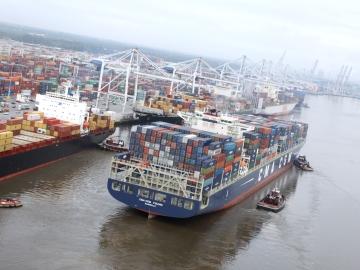
Section Branding
Header Content
Study: 352,000 State Jobs Port-Dependent
Primary Content

A new study says that 352,146 Georgia jobs are in some way dependent on state ports at Savannah and Brunswick.
But the number includes many workers not directly involved in the shipping industry.
The Georgia Ports Authority paid for the report and the University of Georgia's Selig Center for Economic Growth prepared it.
Published every few years, the report is Exhibit A in the port's case for state and federal funding.
But the port's critics say, the figures are inflated, counting retail store clerks and Wal-Mart greeters as port-related.
Report author Jeff Humphreys of UGA's Terry College of Business says, big retailers like Wal-Mart are port users.
"Wal-Mart would benefit not only as a user of the ports but also as a recipient of those dollars that are generated because of port activity," Humphreys says. "It's legitimate."
Counting only directly-related port industry jobs, the number is 21,736.
Directly-related jobs by companies that use the port are 132,148.
The larger number -- the headline number used to lobby for increased port spending -- is an estimate based on workers' consumer spending.
That so-called multiplier bothers Dave Kyler of the Center for a Sustainable Coast.
"The multiplier misleadingly asserts that all jobs related to commerce moving through the Savannah port are exclusively dependent on that port," Kyler says. "However, if the port closed tomorrow, most of those jobs would still exist."
In other port-related impacts, the report found that in fiscal year 2011, the ports accounted for:
-- $66.9 billion in sales (9.5 percent of Georgia’s total sales);
-- $32.4 billion in state GDP (7.8 percent of Georgia’s total GDP);
-- $18.5 billion in income (5.2 percent of Georgia’s total personal income);
-- $4.5 billion in federal taxes;
-- $1.4 billion in state taxes; and
-- $1.1 billion in local taxes.
For the first time ever, the report analyzed the ports' economic impact on different regions in the state.
In the 10-county Metro Atlanta region, for example, it says that more than 150,000 jobs are port-related.
"The results of the Terry College study are very encouraging," says Curtis Foltz, Georgia Ports Authority executive director. "It is clear from the study that the ports fuel a dynamic economic engine, especially considering the research was done at a time when the national economy marked slow to no growth."
The report's publication comes during a public comment period on the proposed Savannah Harbor Expansion Project.
US Army Corps of Engineers officials are soliciting comments through June 5th on the $600 million plan to deepen the Savannah harbor, a top priority for ports officials.
Tags: Metro Atlanta, Savannah, University of Georgia, Port of Brunswick, U.S. Army Corps of Engineers, US Army Corps of Engineers, Georgia Ports Authority, Curtis Foltz, Army Corps of Engineers, Savannah Harbor, GPB News, Port of Savannah, Jeffrey Humphreys, orlando montoya, UGS Terry College of Business, harbor deepening, Georgia ports, Terry College of Business, Dave Kyler, Center for a Sustainable Coast, University of Georgia Terry College of Business, Savannah Harbor deepening, Savannah Harbor Deepening project, deeper harbor, Jeff Humphreys, The U.S. Army Corps of Engineers
